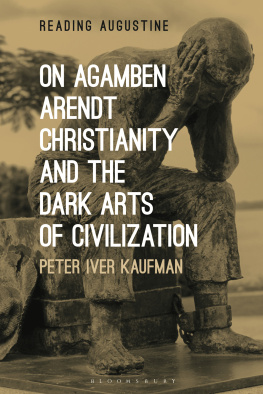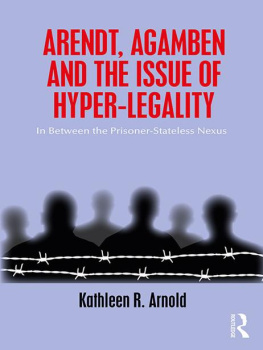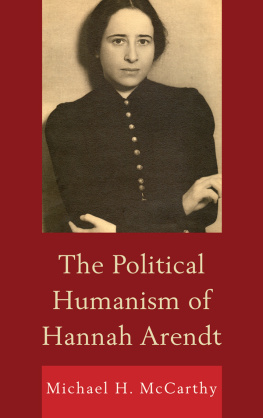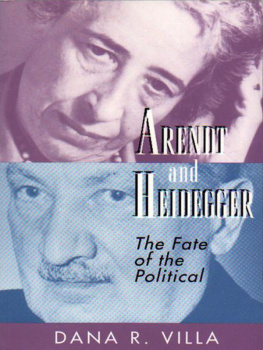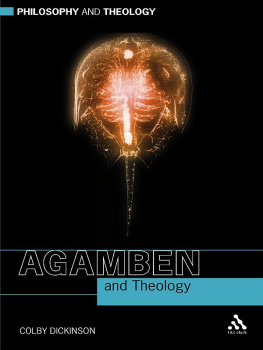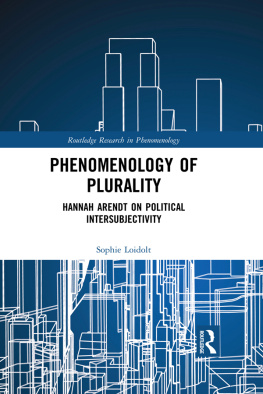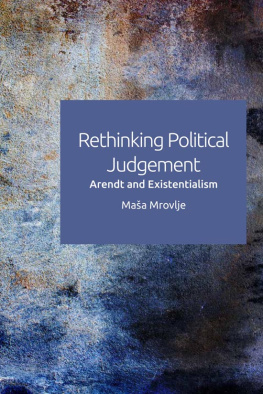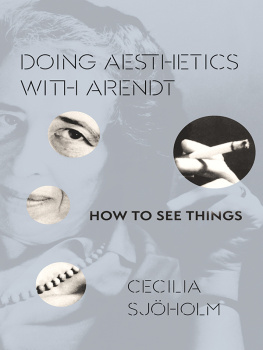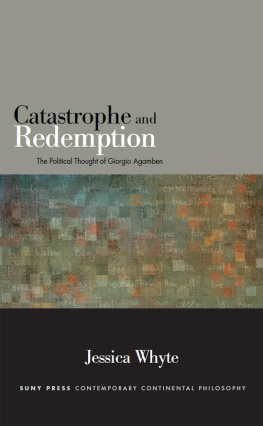On Agamben, Arendt, Christianity, and the Dark Arts of Civilization
READING AUGUSTINE
Series editor
Miles Hollingworth
Reading Augustine offers personal and close readings of St. Augustine of Hippo from leading philosophers and religious scholars. Its aim is to make clear Augustines importance to contemporary thought and to present Augustine not only or primarily as a preeminent Christian thinker but as a philosophical, spiritual, literary, and intellectual icon of the West.
Volumes in the series
On Ethics, Politics and Psychology in the Twenty-First Century, John Rist
On Love, Confession, Surrender and the Moral Self, Ian Clausen
On Education, Formation, Citizenship and the Lost Purpose of Learning, Joseph Clair
On Creativity, Liberty, Love and the Beauty of the Law, Todd Breyfogle
On Consumer Culture, Identity, the Church and the Rhetorics of Delight, Mark Clavier
On God, the Soul, Evil and the Rise of Christianity, John Peter Kenney
On Music, Sound, Affect and Ineffability, Carol Harrison
On Self-Harm, Narcissism, Atonement and the Vulnerable Christ, David Vincent Meconi
On Agamben, Arendt, Christianity, and the Dark Arts of Civilization
Peter Iver Kaufman

Contents
For three years Ive been trying out the interpretations youll find here. Faculty and student colleagues at the Universities of Virginia, Chicago, North Carolina, and Richmond as well as at Samford and Fordham Universities have been remarkably generous; their comments, questions, and, above all, criticisms have kept me thinking and rewriting. Chuck Mathewes, at the University of Virginia; Eric Gregory, at Princeton University, and Bob Dodaro, at the Institutum Patristicum Augustinianum, Rome, have been with me every stepinasmuch as their granite resolve to find resources in Augustines political theology for what they variously call hopeful citizenship, democratic citizenship, and the just society in our messy political cultures continues to stir my resolve to find in Augustine resources for a much more radical alternative. Im tremendously grateful that discussing our disagreements only deepens our friendships. And immensely helpful comments and encouragement from Ward Blanton, a former student and, now, faculty colleague at the University of Kent, Canterbury, marked a renewal of our friendship, for which I am thankful.
When I moved from a research (or R1) university to my current post at a relatively small liberal arts college, I feared that chasing down texts in their original languagesand much of the interpretive literature from Europewould be challenging, if not impossible. But I was surprised. My new colleagues in the University of Richmond libraryLucretia McCulley, Sam Schuth, Travis Smith, Jalesa (Lese) Taylor, and Kimberly Wolfecould not have been kinder or more resourceful. I cram their inbox with requests; they inspire me with their friendships, enthusiasm, and effectiveness. Im clearly the beneficiary in this lopsided relationship. The preface will explain what Ive written and, in part, why. But thered be no what or why without them or without Miles Hollingworth, editor of the series, who said writeand, sometimes, wrong. Expressing confidence in the project from the start, he got its pulse racing with his every email, commenting insightfully on its trajectory and critically on its compass. This series is a tremendous tribute to Miless ingenuity, and this volume is my thanks for his having risked letting a historian poach in political theory and cultural criticism.
The conceit here is that pilgrims, refugees, and pariahs have unique, useful perspectives on the socially and invidiously constructed concept of citizenship. Awareness of that has led this books three principals to offer alternatives. Nearly twenty years ago before I became aware of contributions Augustine, Arendt, and Agamben could make on this issueUniversity of North Carolina undergraduates and I organized the Scholars Latino Initiative (SLI) to assist undocumented high school students prepare to compete for admission toand to survive incolleges and universities. SLI has worked with several hundred high school students and has expanded. Virginia has three chapters. The students, undergraduate mentors, site directors, and our community partners compose what, given the political climate, has become an underground railway to higher education. These twenty years, they have taught me more about courage, perseverance, and resourcefulness than all I did and read during the previous fifty plus. Theyve taught me what to look for in Augustine, Arendt, and Agamben. Gratefullyaffectionatelythis book is dedicated to the SLI family.
(Abbreviations conform to those in the Augustinus-Lexikon . For convenient access to Mignes edition in Patrologia, series Latina , see http://www.augustinus.it/latino/index/htm. I have also consulted the more recent critical edition, Corpus scriptorum ecclesiasticorum Latinorum ).
acad. | De Academicis libri tres. |
bapt. | De baptismo libri septem. |
c. ep. Man. | Contra epistulam Manichaei quam vocant fundamenti liber unus. |
c. ep. Parm. | Contra epistulam Parmeniani libri tres. |
c. Faust. | Contra Faustum Manicheum libri triginta tres. |
c. Iul. | Contra Iulianum libri sex. |
c. Iul. imp. | Contra Iulianum opus imperfectum. |
c. litt. Petil. | Contra litteras Petiliani libri tres. |
c. Sec. | Contra Secundinum Manicheum liber unus. |
cat. rud. | De cathecizandis rudibus liber unus. |
civ. | De civitate dei libri viginti duo. |
conf. | Confessionum libri tredecim. |
Cresc. | Ad Cresconium grammaticum partis Donati libri quattuor. |
div. qu. | De diversis quaestionibus octoginta tribus liber unus. |
en. Ps. | Enarrationes in Psalmos. |
ep. | epistulae. |
ep. Io. tr. | In epistulam Iohannis ad Parthos tractatus decem. |
exc. urb. | De excidio urbis Romae. |
exp. Gal. | Expositio epistulae ad Galatas liber unus. |
gest. Pel. | De gestis Pelagii liber unus. |
gr. et lib. arb. | De gratia et libero arbitrio liber unus. |
Io. ev. tr. | In Iohannis evangelium tractatus CXXIV. |
mor. | De moribus ecclesiae catholicae et de moribus Manicheorum libri duo. |
op. mon. | De opere monachorum liber unus. |
ord. | De ordine libri duo. |
pecc. mer. | De peccatorum meritis et remissione et de baptismo parvulorum ad Marcellinum libri tres. |
persev. | De dono perseverentiae liber ad Prosperum et Hilarium secundus. |
praed. sanct. | De praedestinatione sanctorum liber ad Prosperum et Hilarium secundus. |
reg. 2 | Regula: Ordo monasterii. |

